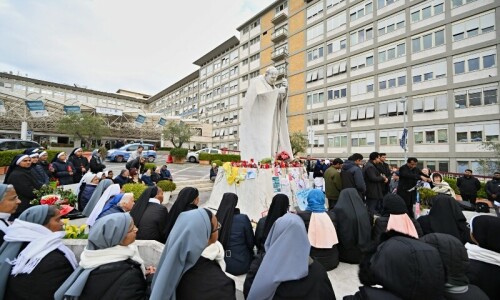THIS is apropos of Dr Muhammad Ali Siddiqui's letter on the Pakistan Civil Service (July 27). Ayesha Siddiqa, in her article on governance provided arguments from both sides of the debate but Dr Siddiqui chose unilaterally to lambaste and crucify the present-day civil service questioning their qualities and abilities.
Being a position holder of the CSS examinations in 2005 and a member of the police service, at present serving in the NWFP, I feel obliged to present the alternative point of view. There is no denying the fact that quality of service has suffered badly over the years, which is evident in each and every sphere of our national politics.
But seeing my colleagues belonging to various groups and working under the seniors, I have no qualms and hesitation in saying that they are still among the best equipped as far as academic, professional and analytical skills are concerned.
Anybody who has interacted with profit-hungry businessmen or mealy-mouthed, ignorant private sector employees, shortsighted and parochial politicians and hard-to-miss charlatans posing as analysts and experts on the electronic media will definitely agree with me.
Dr Siddiqui, while lamenting the deterioration of standards in the civil service, has conveniently ignored the contributions made by countless officers who have made the nation proud at various global forums. Ayesha Siddiqa herself belonged to the civil service.
Another recent example is of Dr Hasan Abbas, who was a member of the Police Service of Pakistan and is now a fellow at the Harvard University and has written an authoritative book on extremism.
Of course, nowadays, because of pressure and exigencies of service, civil servants don't have the luxuries that their predecessors had of being able to indulge in all-time academic pursuits.
Civil servants are a product of a competitive selection process, rigorous and comprehensive training and hostile and demanding working environment. It is up to the government to make use of their knowledge, skills and perspicacity.
UMAR RIAZ Peshawar
(II)
APROPOS Dr Muhammad Ali Siddiqui's letter, 'Civil Service of Pakistan' (July 27), in response to Ayesha Siddiqa's article, Dr Siddiqui writes that “the CSS examinees drawn from the humanities and professional subjects were largely fed on Dogar's general knowledge and other “'How to... stuff' kits, apart from a depleted curriculum of professional education programmes.”
Dr Siddiqui seems completely oblivious of the CSS examination syllabus. Some professional subjects are optional, but there is a fine blend of humanities, social sciences and other categories in the syllabus. It appears from his perception that he equates CSS examinations with the simple 50 MCQs test, comprising simple general knowledge. Whereas, GK in CSS carries 300 marks out of 1,200. The CSS curriculum also includes everyday sciences, current affairs and Pakistan affairs.
Dr Siddiqui should go through the website of the Federal Public Service Commissions (the only institution that has jealously maintained its credibility) and read up on how CSS examinations are conducted.
For CSS 2008, about 4,500 graduates appeared for examination, and only 357 were successful. For CSS 2009, more than 9,000 had applied, whereas only 250 to 300 (average) candidates will be successfully selected for appointments in 12 occupational services.
Dr Siddiqui suggests a refresher course in effective expression in English, besides Pakistani languages of the areas the applicatns are supposed to serve, so that their cognitive faculties were tested intermittently, if not annually. If only he knew that English is the backbone of the CSS examination, for English essay, précis and composition are compulsory subjects and very essential during service as well. In training and during the UT period, officers have to serve across Pakistan. I know a good number of Punjab-domiciled officers who while serving in Sindh learnt Sindhi. Similarly officers from Sindh and the NWFP, who served in Punjab, could speak Punjabi fluently. The facts need to be rechecked.
SHABIR AHMED SETHAR
Larkana













































